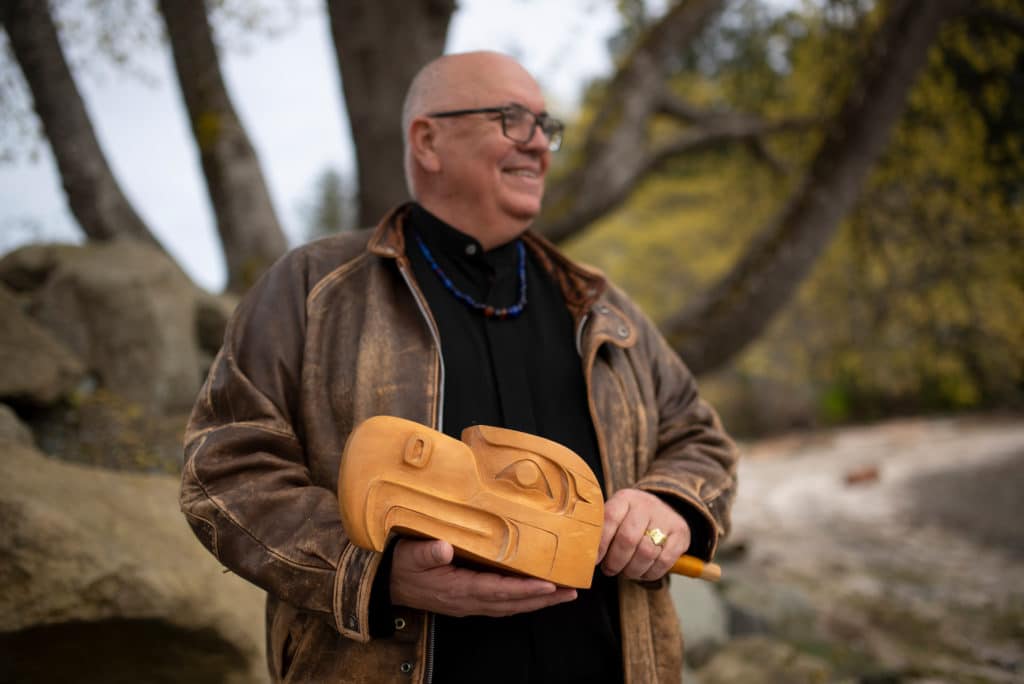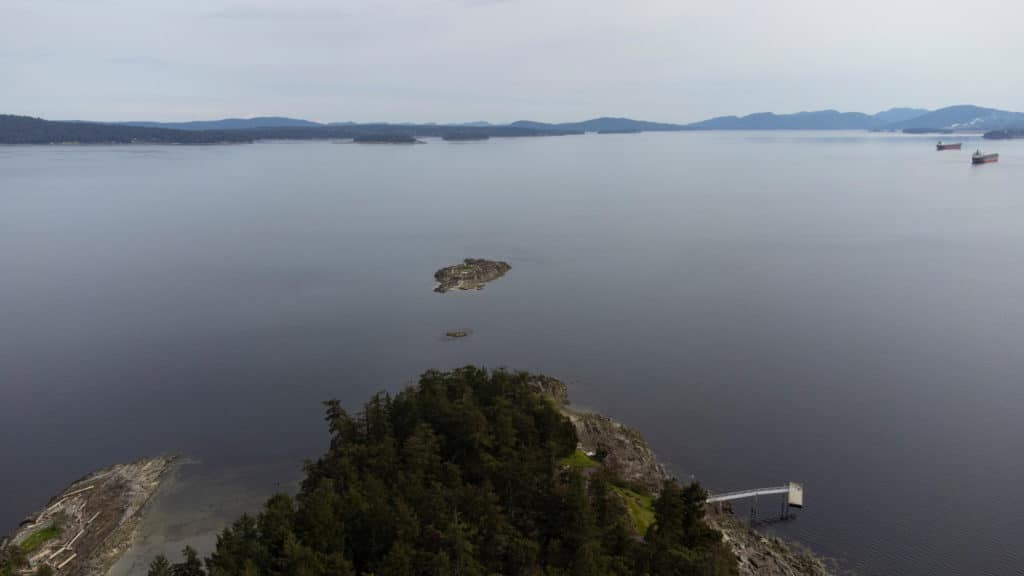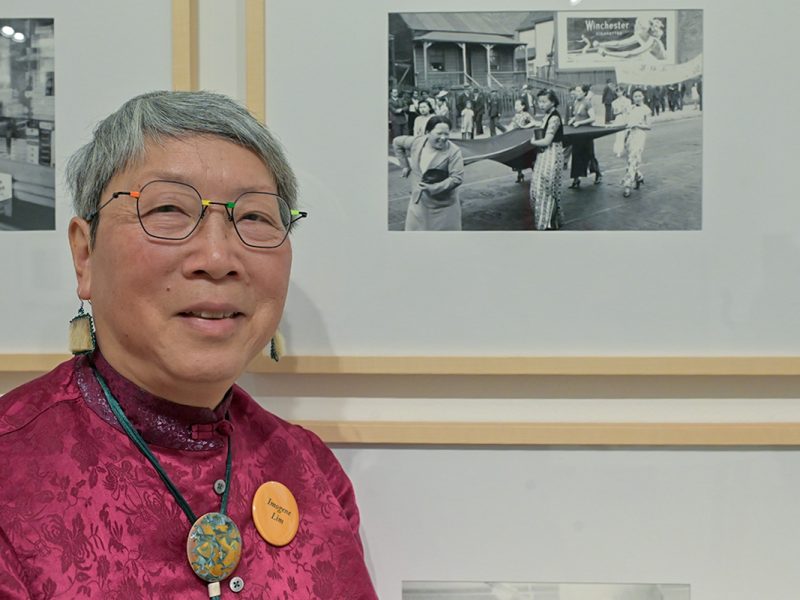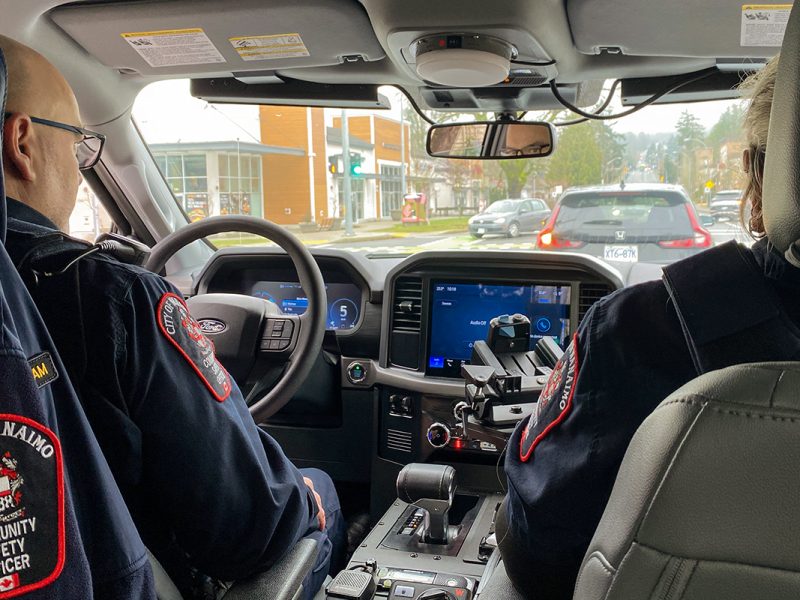
A brightly coloured watercolour painting from Daniel R. Elliott’s series Winds of Change tells the story of his Elder, shown slumped on the sidewalk in blue jeans and a brown hoodie, face contorted, fists clenched. Crouched beside him is his Nuu-Chah-Nulth grandfather wearing full Regalia, marked by the crown of an Eagle mask, calling on his grandson to transform.
Elliott is an artist, traditional medicine man and member of the Stz’uminus First Nation (pronounced Stu-ME-nus) who is Scottish on his mother’s side. His artwork reflects a lifelong career spent empowering Indigenous people to heal on their own terms.
In his 21 years working as a counsellor focused on cultural healing in schools, prison and healthcare settings, he’s seen the “rebirth” that can take place when Indigenous people are provided with culturally relevant care. Through watercolour, he shares these stories of transformation to inspire compassion and understanding of the ongoing impacts of colonization.
At the Stz’uminus Health Centre where he works and elsewhere, he’s encountered apprehension among Indigenous clients about working with physicians and other healthcare professionals as a result of ongoing systemic oppression and intergenerational trauma, rooted in the legacy of colonial institutions such as residential “schools” and Indian “hospitals.”
So when his non-Indigenous colleague Kim Trottier, a dental therapist who has spent many years working with First Nation communities, brought to him the concept of a mentorship circle to support non-Indigenous healthcare workers in better serving Indigenous people, Elliott was immediately interested.
“I’m just like, oh my gosh, yes. Like, I need to do this,” he recounts.

Elliott is now a founding member of the organization Culturally Committed, which connects more than 70 healthcare professionals, mostly on Vancouver Island and as far away as Manitoba, with Indigenous mentors. With guidance, these professionals are learning how to transform their practice to offer more culturally relevant care for Indigenous patients.
The program offers workshops and speaker series like Truth, Resilience and Reconciliation led by Jenn Smith of Tlowitsis Nation (pronounced tlow-eet-sees), to educate participants on the impacts of institutions like residential “schools” while leaving space for self-reflection and sharing, says Elliott, who is also a Sweat Lodge Keeper. To create an environment that’s safe for everyone, he often sits with the group as an Elder, counsellor and supporter.
“By design, our education systems soften and minimize the ongoing impacts of colonization,” says Elliott. He describes the learning experience as “gut-wrenching, eye-opening, lots of aha moments” for all.

Professional members of the community who pay a monthly fee have access to monthly “community calls.” Doctors, psychiatrists, pediatricians and other members of the community, who include educators and social workers, send in questions about their practice and gather with Indigenous mentors on Zoom to address them. How to integrate offerings or gifts into healthcare practices and be a good ally in complex situations are some of the discussions that take place.
“We say there’s no silly questions,” Elliott says. “We provide space and safety and knowledge and cultural relevance to somebody’s questions, practices, or whatever they’re wanting to have information on.” He points out that advice will be different for every nation, but there are similarities the diverse group of mentors can expand on.
Culturally Committed offers a map of healthcare providers who are members of the community and committed to improving their care. These members are given a window decal to display in their office space, and a pin they can wear.
“That doesn’t mean they’re culturally wise and they got all these certifications for being a cultural support,” says Elliott. “But it recognizes that they have an intention to work in a good way with you.”
A weekly newsletter features insights from Knowledge Keepers on a range of issues from the benefits of traditional foods, shared by Jared Qwustenuxun Williams to the power of laughter shared by comedian Don Burnstick.

“We’re working in this kind of liminal space that exists, bridging western society and Indigenous people and knowledge and culture,” says Elliott. Having grown up adjacent to the reserve, he explains he’s been on his own journey of reconnection to culture and teachings. “I’m walking these two worlds all the time… my lifelong journey is to try and find ways to bridge that.”
Elliott says the program also helps overcome the apprehension he often sees among non-Indigenous people and organizations who lack understanding and knowledge of working alongside Indigenous people.
“There’s some major things that we need to unlearn as a society,” he says, which can feel overwhelming. These honest conversations are helping practitioners gain the knowledge and confidence they need to create change.
“We are relationship building,” he says. “That’s some of that groundwork that really needs to happen.”
Responding to anti-Indigenous racism in healthcare
Culturally Committed was in the works just as the In Plain Sight report was released in 2020, the result of a year-long investigation into anti-Indigenous racism within the B.C. healthcare system.
The report also includes a series of specific recommendations that build on the Truth and Reconciliation Commission’s Calls to Action released in 2015, which call on people within the healthcare system to integrate Indigenous healing practices “in collaboration with Aboriginal healers and Elders where requested by Aboriginal patients.”
Co-founder Kim Trottier points to a quote that stood out to her in the In Plain Sight report: “While those who experience the problem of racism in the healthcare system must be intimately involved in developing solutions, we know that the responsibility and burdens of this work lie with non-Indigenous individuals, communities, organizations and governments.”
Culturally Committed was designed in alignment with the report’s recommendations by providing avenues for patients to share confidential feedback in response to service from a Culturally Committed health care provider, says Trottier.
Cultural safety initiatives within the healthcare system have been around for a while but are not without challenges. In February 2021, an investigation from IndigiNews found that members of the cultural safety team at Island Health, who are tasked with supporting patients with culturally appropriate care, faced scapegoating and “backlash” in the wake of the In Plain Sight report. The report had identified the inadequacy of these programs in face of the systemic change needed to address racism and Island Health allegedly placed the blame squarely on this small team of Indigenous support workers.
Related: Workers tackling anti-Indigenous racism say they faced scapegoating and ‘backlash’ at Island Health

A new form of cultural safety training
Trottier is a settler with German and English heritage. She says she knew about residential “schools” growing up near one in Brandon, Manitoba. When she moved to the Island and began working as a dental therapist, she said she was provided with the San’yas cultural safety training, which gives an overview of the colonial history of British Columbia.
“It was good groundwork, but I really still didn’t know how to approach my practice in a way that was safe,” she recalls.
In one instance, she said she asked a patient about a ceremonial practice, and the patient didn’t want to respond. Later, another worker told her, “Oh, my gosh, you can’t ask that.”
Through relationships, Trottier has learned lessons like the importance of allowing for time with Elders. “In contrast to how I approach patient care, everything happens so quickly [throughout the healthcare system]. And sometimes you’re kind of like prompting people along, or you’re just not taking the time to allow those moments of silence.”
To encourage genuine relationships, Culturally Committed is deliberately structured as a voluntary program, she explains. “We really need people who want to be there. Not [those] that are just looking to get their continuing education points, keep their license active, or [tick] the cultural safety box for their workplace,” says Trottier. “I think that once it becomes mandatory, you really lose that intention and that connection.”

So far, Culturally Committed has been operating without external funding. Paid memberships for professionals cover the cost of the mentors’ honoraria, speakers and newsletter contributors, as well as operating costs.
Though it’s too early to measure impact, Trottier says they’ve been encouraged to keep going. Feedback from members of the community shows they are absorbing and implementing what they’ve learned, says Elliott.
One emergency room doctor serving Duncan and Ladysmith told Elliott that the mentorship has helped her transform the way she views Indigenous patients. She’s been inspired to help bring Indigenous Knowledge of plant medicines to the healthcare setting, alongside the western model of healing.
Trottier suggests people who want to get involved sign up for the Culturally Committed mailing list to receive weekly insights from Knowledge Keepers, upcoming events and ways to participate. There’s also an “active ally membership” for non-Indigenous people not directly providing care to Indigenous patients to learn from speakers and engage with the mentors.
“There’s some really amazing things happening,” says Elliott. “And it was because of Culturally Committed that we have that relationship.” [end]



